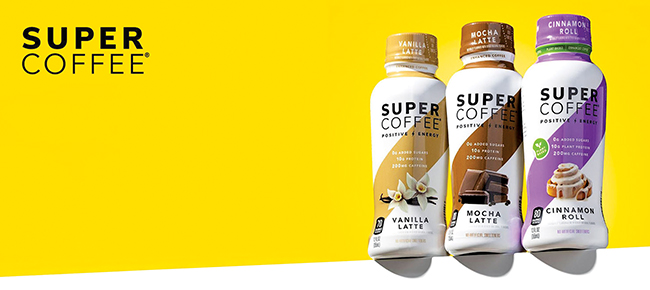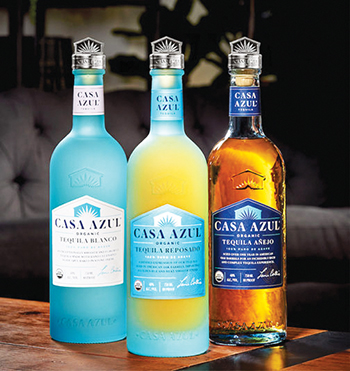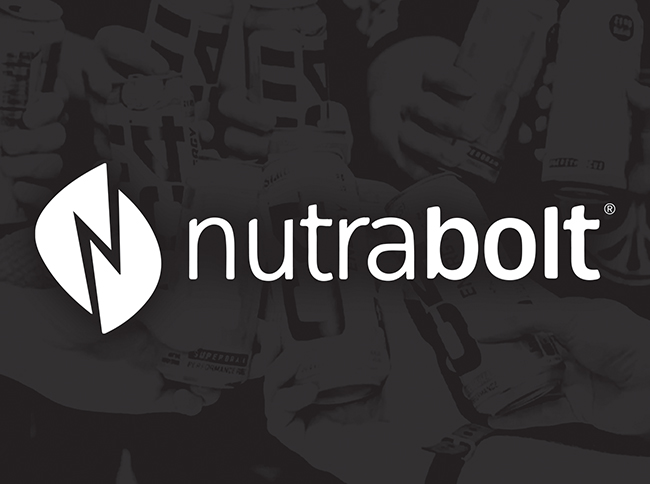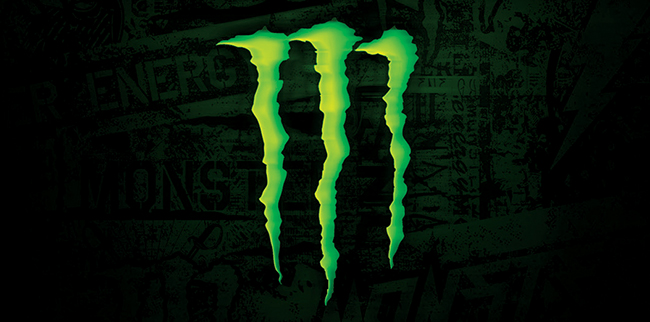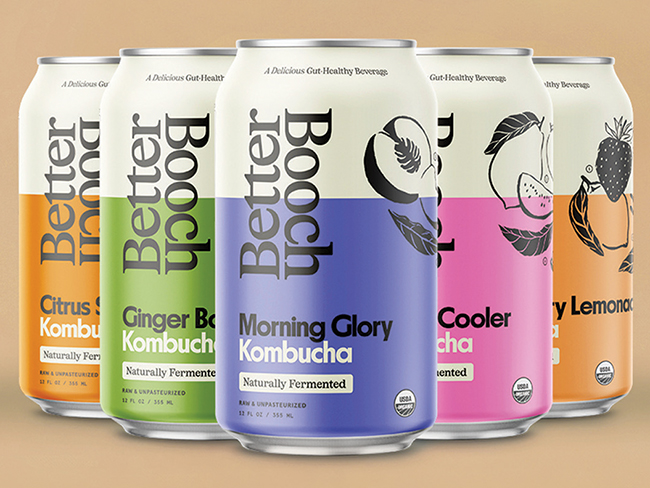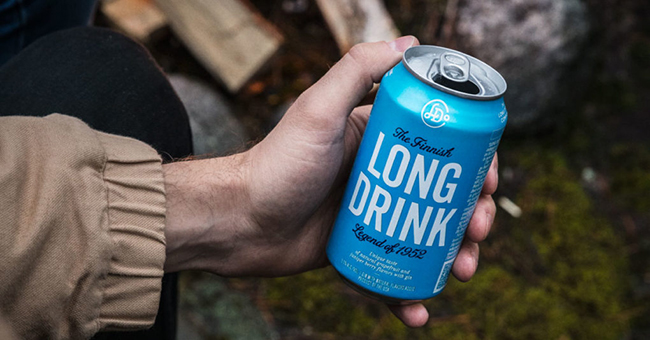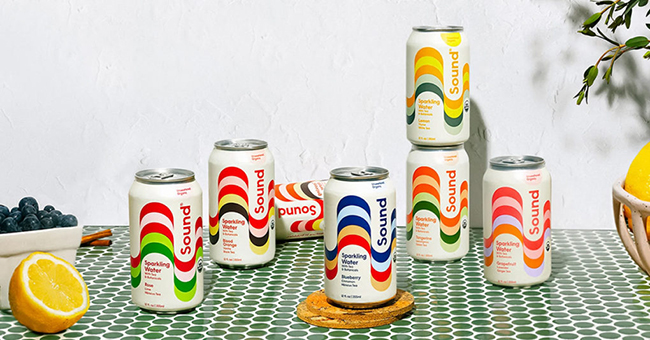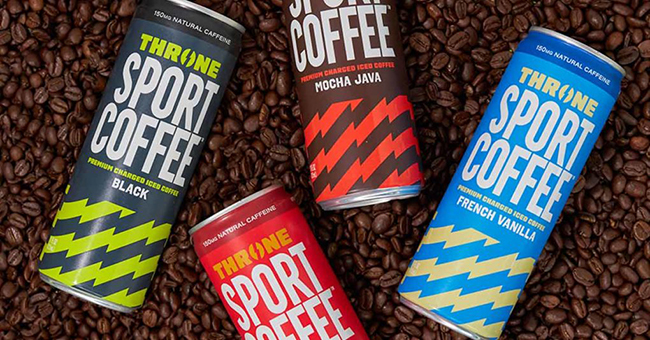Bevscape: The Latest Beverage Brand News
Super Coffee Founder Jordan DeCicco Named Interim CEO
Super Coffee’s new CEO is a familiar face: founder and chief operating officer Jordan DeCicco was named interim chief executive in early May following Tyler Ricks’ departure to frozen food brand Caulipower.
Ricks, meanwhile, is the new CEO at frozen food brand Caulipower.
Ricks joined Super Coffee as an investor and board member in 2018 before moving to day-to-day operations full-time as the company’s president in March 2022. He was promoted to CEO in December 2022, and remains an investor in the company.
“I came in two years ago in what I thought would be a shorter term consulting role to help get the business from a high-growth, highly unprofitable company to more solid footing in this financial environment,” he said, citing an 80% reduction in EBITDA losses as one of his top achievements. “Now that we have the business really starting to turn the corner, it seemed like a logical time to transition to a new CEO that will stick to the strategy we laid out but also bring some new ideas to the table.”
Appointing Jordan DeCicco as CEO – in addition to being a “really nice story” for the founder – puts the company in the hands of someone who’s been a “huge driver of the transformation,” said Ricks.
“I think we really achieved a lot of what Tyler was brought on to help us do,” DeCicco said. “We feel we have a foundation and team and product strategy to keep that going. So I’m ready for it.”
Launched as a keto-friendly alternative to protein-rich “Bulletproof”-style coffee, Super Coffee’s identity evolved as its product range and channel spread expanded. The brand, which has a national distribution partnership with Anheuser-Busch, has grown into a major player in RTD coffee, with a presence in over 50,000 stores nationwide, but has struggled to temper persistent losses.
At the end of Ricks’ run, though, Super Coffee was about “85-90%” to executing its strategic shift towards profitability, the outgoing CEO noted. With an eye on recalibrating efficiencies after several years of heavy spending, the company has cut personnel and marketing spend by 70% and 80%, respectively, DeCicco said.
This year has seen the Austin, Texas-based brand revamp its flagship 12 oz. drink with new packaging and formulation. That product is part of a growing portfolio of lines directed at specific channels, such as newly relaunched 11 oz. Super Espresso for foodservice, 15 oz. Super Coffee XXTRA for convenience stores, and 48 oz. multiserve bottles for grocery.
DeCicco cited encouraging Q1 numbers – total brand velocity is up 7% from January to March, trending up ahead of the expected warm-weather bump – even as the revamped products are still working their way through distribution networks. Ricks estimated they are currently at around 45%, with full expansion being a major priority in the near-term.
Looking ahead, Ricks said Super Coffee’s next permanent CEO should be an “experienced operator” and someone who can provide the company’s braintrust with “the guidance of a good strong thought leadership partner who can help consider all of the different aspects of a decision.”
When asked if he was interested in becoming Super Coffee’s next permanent CEO, Jordan DeCicco was unequivocal.
“Yes, definitely,” he responded. “I think the CEO role obviously will belong to the best person, so we’ll run a search and we’ll hopefully bring some great candidates to the table, and the board, my brothers and myself will hopefully make the best decision long-term for the company. If it turns out to be me, I’d be grateful and I take the responsibility incredibly seriously. But also, if there’s somebody out [there] similar to Tyler who we’d be happy to bring on, we think that would be a great win for the company, too.”
Casa Azul Wins Trademark Case Against Clase Azul
A judge ruled in favor of Casa Azul, the tequila company founded by beverage innovator Lance Collins, in a trademark trial against long standing tequila brand Clase Azul.
On April 15, U.S. District Judge Lee H. Rosenthal in Houston, Texas denied Casa Tradicion, the maker of Clase Azul, the motion for a permanent injunction following a bench trial.
The suit was initially filed in September 2022, after Casa Azul launched a canned tequila soda that summer. Clase Azul filed a trademark infringement action in federal court arguing that the new brand caused undue confusion with its flagship tequila, a high-end brand sold in a handmade ceramic bottle which has retained its trademark since 2008.
Following an unsuccessful effort at mediation, the case moved forward with full discovery with each side filing several pre-trial motions. On November 3 2023, the judge granted Casa Azul Spirits’ motion to dismiss Clase Azul’s claims for monetary relief, and struck its demand for a jury. The rulings narrowed the issues remaining for trial and set up a bench trial this year.
The court found and concluded that because of the dissimilarity between the two brands, as well as other evidence, Clase Azul failed to establish a likelihood of confusion and failed to establish trademark infringement, unfair competition, or trademark dilution.
“We are grateful that the judge so clearly decided in Casa Azul’s favor and this outcome reaffirms our confidence in the distinctiveness of Casa Azul’s brand name, world class products and our commitment to upholding its integrity with USDA Certified Organic Tequila,” said Collins in a statement.
Since releasing the tequila soda, Casa Azul has turned its attention towards its high end tequila of the same name and has recruited a roster of celebrity investors. Those include Mexican-born actress Eiza González, football player Travis Kelce, U.S. Women’s Open Champion Michelle Wie West, among others.
Casa Azul was the first alcohol-based release from a team of beverage industry veterans whose latest innovations have made their marks in the wellness and energy drink categories. NOS Energy Drink, part of FUZE, and BodyArmor Super Drinks sold to the Coca-Cola Company in 2007 and 2021 respectively, with BodyArmor, which Collins co-founded with Mike Repole, ranking as the beverage giant’s largest acquisition at the time at $5.6 billion. Core Hydration was acquired by Keurig Dr. Pepper in 2018.
Clase Azul, on the other hand, made its mark on high-end tequila when it launched in 1997, helping to spearhead the segment. The brand has several tequila and mezcal expressions, ranging in price from $150 to $2,000 and founder Arturo Lomeli’s unique bottle has since found a spot on shelves in over 80 countries.
Nutrabolt Bolsters Leadership Team With Former Red Bull, Hostess Execs
Nutrabolt, the parent company of C4 Energy and Cellucor, revamped its leadership team in May with three new executive-level appointments including Red Bull veterans Louisa Lawless and Jason Cantelli as EVP of commercial marketing and sales and EVP of commercial operations, respectively, and Jack Harnedy as VP of revenue growth management.
Lawless arrived at her new role at Nutrabolt with over 20 years of experience in brand building and management, most recently a stint at wellness beverage incubator Stratus Group, where she served as chief strategy officer building brands like KÖE Kombucha and Perfect Hydration. Before that, Lawless held leadership positions at beverage giants such as Red Bull North America and Core Nutrition, where she helped guide the $525 million sale of Core Nutrition to Keurig Dr Pepper (KDP).
As EVP of commercial marketing and sales, Lawless will oversee the company’s marketing, strategy, and nutritional sales functions across all revenue segments.
Meanwhile, Cantelli most recently spent 15 years at Red Bull in leadership roles for key accounts, distribution and marketing. Prior to that, he spent seven years at the Boston Beer Company in distribution management and key accounts. In his new role as EVP of commercial operations, Cantelli will take charge of food service, specialty retail and beverage distribution.
Harnedy comes to Nutrabolt from snack giant Hostess Brands, where he established the RGM function and “achieved significant revenue growth through efficient and engaging promotions, trade programs and data democratization.” At the supplement and energy drink company, he will be responsible for pricing and promotion scheduling and the analysis of new brands and innovations.
“As they say, ‘Embrace the new, for it’s a path to growth.’ With incredible brands in explosive growth categories, I look forward to contributing to Nutrabolt’s continued success,” wrote Harnedy in a LinkedIn announcement.
Founded in 2002, Nutrabolt first gained momentum among performance athletes and fitness enthusiasts. Over time, the company has expanded into mainstream retail and introduced new lines – such as C4 Smart Energy and its rebranded C4 Workout Powder – to reach everyday consumers who prioritize healthy, active living.
In January, the Austin, Texas-based nutrition supplement maker acquired a 20% ownership stake in TikTok-favorite greens and superfood brand Bloom Nutrition. Aligning with Bloom will help Nutrabolt broaden its audience to include female consumers within the greater health and wellness space; the greens brand is primarily targeted at females between the ages of 18 and 34.
Nutrabolt’s portfolio – which includes energy drink C4, post-workout recovery XTEND, and sports nutrition Cellucor – is currently distributed in over 125 countries, sold online through the brand’s website and Amazon and in-store at retailers like Walmart, Target, 7-Eleven, and Walgreens, among others.
In the two-week period ending April 6, Nutrabolt’s C4 Energy brand posted 35.3% sales growth, according to Goldman Sachs Equity Research’s latest analysis of NielsenIQ data. Additionally, based on Q1 2024 results, C4 claims to have moved into the No. 4 spot in the U.S. energy drink market.
Monster Co-CEO Rodney Sacks Announces Succession Plan in Q1 Earnings Call
Monster Beverage Corporation chief executive Rodney Sacks laid out a likely succession plan in early May that will eventually see co-CEO Hilton Schlosberg taking over the role entirely, as Sacks is “considering” reducing his day-to-day duties sometime next year.
The announcement arrived in connection with a corporate initiative to commence a modified “Dutch Auction” tender offer of up to $3 billion in common stock at a to-be-determined price range. The company plans to use around $2 billion in cash on hand and an additional $1 billion from a new revolving credit facility and delayed draw term loan. A start date for the auction was not given.
Speaking during the company’s Q1 2024 earnings call, Sacks said that he and Schlosberg intend to participate in the buyback offer for “investment diversification and estate planning purposes.”
Sacks said he is “considering” reducing his responsibilities at Monster beginning in 2025, “while continuing to manage certain areas of the company’s business for which I’ve always been responsible.”
“My participation in particular may provide me some flexibility to consider my own potential options, which may also help the company continue succession planning for its next phase of leadership,” Sacks said.
Sacks didn’t clarify how long this wind-down period would last, but said the end goal will be for Schlosberg to take over as the sole CEO of the business while Sacks will remain chairman of the board.
Asked during the call’s Q&A session, Sacks said the decision to initiate a Dutch Auction came in response to “recent softness in the market” providing “an opportunistic time to execute at scale a transaction of this nature” where Monster can “repurchase a greater number of shares and do so more quickly than we could under the programs which we’ve implemented.”
Monster previously issued a Dutch Auction in 2016.
Born in South Africa, Sacks and his business partner Schlosberg acquired legacy beverage manufacturer Hansen Natural Corporation in 1990. Sacks served as CEO of the business until 2021 when Schlosberg joined him as co-CEO.
The company launched Monster Energy Drink in 2002, which quickly became its premier product and is today the largest energy drink manufacturer in the U.S. with annual revenue of over $7 billion, in addition to a global beverage operation.
Better Booch Looks to ‘Future’ of Fermentation With New Ingredient, Brand Vision
With the winds of change at its back, and a novel new ingredient in tow, Better Booch is powering forward under a new North Star of holistic wellness via the microbiome.
As with other fermented foods and drinks, probiotics have long been one of kombucha’s primary callouts, and also, crucially, one of the simplest for consumers to understand. And for the decades in which the category was outside the mainstream, that was largely enough.
Upon gaining broader market traction, kombucha makers – without the ability to make further functional claims on packaging – leaned into highlighting probiotics for digestion at the expense of further exploring the drink’s broad range of benefits, said Better Booch co-founders Ashleigh and Trey Lockerbie.
That’s changing, they noted, as the close relationship between the human microbiome and overall wellness has been extensively detailed over the past decade in scientific journals and university research, and broadly popularized through books like New York Times bestseller Gut and Netflix documentary series “Hack Your Health: The Secrets of Your Gut.”
Of particular interest was a Stanford study that found a diet rich in fermented foods significantly increased the diversity of gut microbes. The study also found these foods decreased 19 inflammatory proteins in the blood, including some linked to chronic diseases, while a high-fiber diet did not significantly affect the diversity of gut microbes or decrease inflammatory proteins.
“I think that science is finally catching up to what we’ve known innately for 12 years now, which is that the microbiome is sort of the key to overall health – physical, mental and even emotional,” said Trey, adding that the company is “seeing a lot of heavy lifting (on education) coming from elsewhere.”
Better Booch has seized on those favorable conditions to reposition under its new identity – Future Beverage Group – as a gut-health beverage platform brand. Its new hero ingredient, Native+, will be key to unlocking that change. Defined as a “combination of a prebiotic soluble fiber, nine strains of proven clinically-studied probiotics strains and a clinically-studied post-biotic,” Native+ aligns with research emphasizing the added benefits of having a diversity of strains, and is now part of every existing and future beverage product from the company.
Kombucha already produces pre-, pro- and post-biotics through natural fermentation, Trey acknowledged, but Native+ further enhances the benefits while helping the product stand out from the crowd.
“Gut health has become such a buzzword in itself to where it’s almost lost its meeting because you have so many companies making claims about gut health, so I’m really excited about this next wave of documentaries and research about fermented foods, specifically, and the way that they can improve gut health,” Ashleigh said. “We’re going to start to see a lot more clarity in that space.”
Within the new brand architecture, the individual roles for each of Future Beverage Group’s products are coming into sharper focus. LIVE Organic Living Soda, acquired last year, plays towards traditional soda aficionados with familiar flavors and more approachable branding, though the founders hope it can serve as a “gateway product” for the company.
The five-SKU refrigerated line, now in 12 oz. cans rather than glass bottles, remains popular within its limited distribution footprint in Texas, and is set to enter SoCal via DSD house LA Distributing soon. A major design overhaul led by Montreal’s Wedge Studio, is set to debut in June.
Elsewhere, award-winning sparkling tea line CHA, currently seeding in SoCal stores, provides a different take on elevated natural refreshment with its four-SKU range of 12 oz. cans. CHA is available at regional chains like Lassens and Bristol Farms, with some DSD service as well.
Both Live and CHA have allowed Future Beverage Group to branch out without adulterating its flagship line, though there are some notable changes. The kombucha is moving from a 16 oz. to a 12 oz. can, a move partly intended to encourage people to pick up a second drink rather than just consuming just one per day; on the downside, it also required a UPC change. The smaller size drops the price to around $3.49 per can, down from a high of $3.99. There’s also a new spring seasonal release coming, Mango Delight, made in collaboration with Florida-based artist Gabriel Alcala.
But maybe the best indication of the company’s future goals comes from a product whose availability is the most limited. Inspired by their decision to ditch alcohol last year, the Lockerbies used a kombucha ferment as the base for developing a non-alcoholic “wine” akin to champagne, dubbed Native. The fledgling project, which sold out of its initial run of 750 ml bottles offered exclusively online, will add a second Rosé-inspired flavor in the near future.
Jay-Z’s Marcy Venture Partners Backs The Finnish Long Drink
Jay-Z’s Marcy Venture Partners is the latest group to invest in ready-to-drink brand The Finnish Long Drink, the company announced in May.
Marcy Venture Partners— the firm co-founded by rapper/mogul Shawn “Jay-Z” Carter, CEO of RocNation Jay Brown, and Larry Marcus—has made a “significant investment in the brand to support the Finnish Long Drink’s continued momentum within the U.S. market,” read a statement.
Carter, a noted investor and entrepreneur in addition to his music career, has history in the alcohol business, having acquired U.S. distribution rights in 2002 for Scottish vodka maker Armadale in his role as co-founder of Roc-A-Fella Records. Last year, a year-long legal dispute with Bacardi was resolved when the spirits giant announced it has agreed to acquire the majority of Cognac venture D’ussé, with Carter retaining a significant ownership stake through his company SCLiquor.
Now his firm joins a roster of other celebrities like actor Miles Teller, DJ Kygo, and professional golfer Rickie Fowler backing one of the highest-selling RTD brands, inspired by a Finnish gin cocktail. Since debuting in 2018, the brand has closed multiple fundraising rounds, the largest reaching $25 million in July 2021. Other backers include Founders Brewing Company co-founder Mike Stevens and a number of athletes and entertainment industry figures.
Launched by the Finnish trio of Sakari Manninen, Mikael Taipale and Ere Partanen, alongside American entrepreneur Evan Burns, the brand offers four interpretations of the beverage it describes as a citrus soda with real liquor. Those expressions include traditional, zero (sugar-free and carbless), cranberry, and strong (which ups the ABV from 5.5% to 8.5%). It’s one of a few RTDs that have found success becoming the call brand through building their respective stories around very specific cocktails that haven’t yet hit the mainstream.
Since its U.S. launch, The Finnish Long Drink has doubled its sales each year, reaching nearly 2 million nine-liter case sales in 2023, according to the brand. The RTD increased dollar sales 91.9% in NIQ-tracked off-premise channels in the last 52 weeks ending April 20, outpacing the total RTD category at 36.6%.
Marcy Venture Partners has made other headlines recently, as it is reportedly close to finalizing a billion-dollar merger with the investment arm of Pendulum Holdings. Marcy Venture includes a diverse range of businesses in its portfolio from Rihanna’s Savage Fenty, to chicken nugget startup Simulate, and to the parenting resource Babylist. The firm has also invested in allergen-friendly cookie maker Partake Foods, and outside of MVP, Carter has investments in Oatly and Impossible Foods Inc.
Sound Acquired by PE Partner, Restocks After Dry Spell
Sparkling beverage brand Sound is back in supply after its acquisition in May by operating partner Next in Natural, a New York-based private equity firm specializing in better-for-you CPG.
According to the company, Next in Natural CEO Jeff Lichtenstein has been appointed Chairman of the Board for the brand “to assist with strategic guidance” as Sound founders Salim Najjar and Tommy Kelly remain with the business. Financial terms of the deal were not disclosed.
“Sound epitomizes what’s next in natural – delicious, organic, clean, functional ingredients, and no sugar are aligned with consumer demand for just that, in a convenient format,” Lichtenstein said in a release. “Salim and Tommy have an amazing story having met as Nuclear engineers that decided to make the mother of all pivots, into Organics! They are very talented executives, and the Next In Natural shared services platform is designed to help them thrive with the cross-functional comprehensive support team and resources that NeNa surrounds them with.”
Lichtenstein previously founded Gourmet Guru, which was acquired by UNFI, and has worked to scale brands such as Chobani, Stumptown and Hu.
“Sound is on track to propel the company’s growth by leveraging Next In Natural’s cross-functional team and expertise in production, R&D, business development, and marketing, which will help us evolve and reach new audiences,” Kelly added in the release.
The company was founded in 2015 and initially produced a line of carbonated teas in glass bottles, before pivoting to cans with a rebrand in 2021 that repositioned the drinks as sparkling waters made with tea and botanicals.
The acquisition follows a quiet period from the brand, which had ceased posting on social media last fall while consumers have reported out of stocks across channels during that period. But as of today Sound is back in stock online via its website, and the company said it is also available in select retailers nationwide and online via Thrive Market.
Next In Natural, which focuses on operations support and strategy for food and beverage companies, announced in March that it had expanded its M&A division, appointing Keto & Co. founder Ted Tieken as Chief Future Officer. In a press release, the firm said its ideal candidates for acquisition are in the $5-$50 million revenue range and “preferably in the beverage and salty snack space, with founders at an inflection point” with “a proven product but need support reengineering or scaling their business.”
“We Play To Win”: Former BodyArmor Exec, Patrick Mahomes Launch Sport Coffee
It’s not quite football season yet, but as we detailed earlier, three-time Super Bowl-winning quarterback Patrick Mahomes announced in May that he’s looking for a new arena to conquer.
Mahomes is entering the beverage business, joining former BodyArmor executive Michael Fedele to launch Throne Sport Coffee in a venture that seeks to disrupt the RTD coffee category. Behind Fedele, the Kansas City Chiefs QB is the second largest shareholder in the brand.
“I wake up every single morning and I’m getting coffee,” Mahomes said. “It gets a little bit more during the season than in the offseason but I drink a lot of coffee.”
Fedele, who left BodyArmor in December 2022 after over 10 years with Coca-Cola, had been developing a “sport coffee” formulated for athletes and sent Mahomes prototype samples.
“I was able to try those out and know that I was drinking coffee which I love, but a healthy version,” Mahomes added. “I could drink it during the season and didn’t have to worry about the effects of how I feel after [or] if I would be sluggish after the coffee has worn off.”
Throne Sport Coffee is targeting health-conscious coffee drinkers, not energy drink consumers, Fedele said, but is doing it with a product that balances flavor with ingredients that speak to an active lifestyle.
The 4-SKU, NSF Certified for Sport line – available in Black, Mocha Java, Salted Caramel and French Vanilla – come in 11 oz. cans with 150mg caffeine, B vitamins, electrolytes and branched-chain amino acids for recovery. The cans will retail for $3.99. Throne’s flavored varieties are sweetened with pure cane sugar (8g added), are dairy-free and have 50 calories.
The brand initially will be in about 3,000 outlets in 20 states as well as on the company’s website and Amazon. Convenience chain Casey’s and Hy-Vee are two of Throne’s major launch partners as the brand focuses on c-stores and some conventional retailers in the Midwest and Plains regions.
Positioning as a better-for-you coffee product was important because athletes like Mahomes rely on coffee to fuel their active lifestyle, Fedele said.
Finding a niche in RTD coffees is no easy task as the category grows with celebrity-backed brands like Happy and Chamberlain Coffee targeting young consumers while artisan roasters (La Colombe, Verve and Equator) expand deeper in the set.
The active-lifestyle coffee drinker is not untapped territory either. Super Coffee has been positioning its high-protein, low-sugar RTD canned drinks to these consumers for nearly a decade with a variety of SKUs. Chocolate milk maker Slate has found traction among fitness-focused individuals seeking protein-rich, caffeinated drinks with its latte line.
Throne is betting that having the clout and reach of one of the best football players in the league will help propel the brand forward. Mahomes is no stranger to endorsement deals. Over the years, he has put his personal brand behind Essentia, PRIME, and BioSteel, but Throne is the first beverage brand that Mahomes has taken an active ownership stake in and has been part of the formulation and launch strategy.
“More than the investment you have to believe in the product and think that the product’s going to take off to another level,” he said.
Setting the brand up for that kind of success, Fedele has built his team with beverage industry professionals, many of whom worked with him at BodyArmor.
“Our team is a group of competitive people,” Fedele said. “From Patrick [Mahomes] to myself to the team that’s behind this brand, we play to win.”


Receive your free magazine!
Join thousands of other food and beverage professionals who utilize BevNET Magazine to stay up-to-date on current trends and news within the food and beverage world.
Receive your free copy of the magazine 6x per year in digital or print and utilize insights on consumer behavior, brand growth, category volume, and trend forecasting.
Subscribe